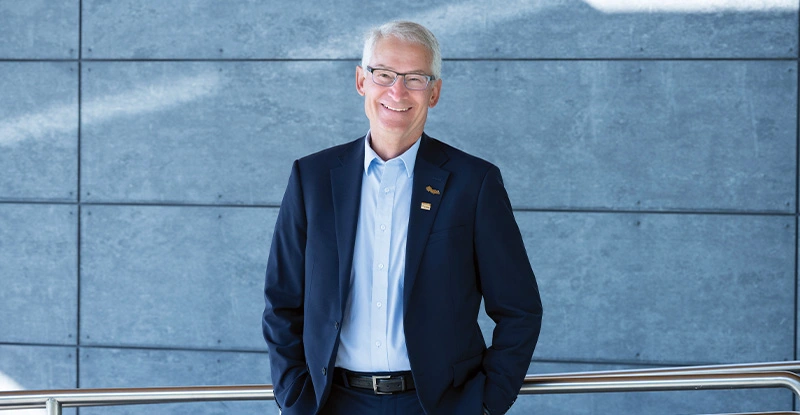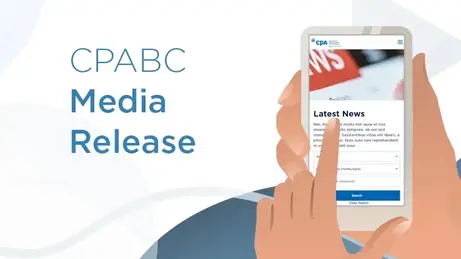
CPABC Board Chair Alain LeFebvre, FCPA, explains why he keeps stepping up
“How can we make things better?”
It’s something Alain LeFebvre asks himself when approaching any challenge. His is a can-do attitude—one he attributes to his father.
“My father was a millwright,” he says. “He was a skilled tradesperson who installed, maintained, repaired, and dismantled machinery. Basically, he did everything, and often without an instruction manual! Dad said if you want to get something done you better roll up your sleeves and get involved. He stood by his words and was highly active in our small community.”
That small community is Prince George, where Alain was born and raised.
“There are about 125,000 people in the general area now,” he says, “but back when my father moved here in the 1950s, it was more like 5,000.”
It was in this small but bustling town, buoyed by a lumber boom and subsequent pulp mill boom, that his parents would build a life with eight children. As the youngest, Alain drew inspiration from his siblings.
“They were all great role models for me,” he says. “They helped shape my drive to make things better.”
Alain was very young when his mother died and 10 when his father remarried. His stepmother, who recently turned 101 in her hometown of Sainte-Anne-de-la-Pérade, Quebec, soon became another significant influence in his life.
“She stoked my ambition,” he says. “She was a head nurse from Montreal who’d come to Prince George for three days with a youth exchange group, and she ended up leaving her life in Montreal to move west! She encouraged me to be open-minded, learn French, and work hard in school to go to university.”
It was with this determination in mind that Alain attended a pivotal career fair in 10th grade.
“I talked to the students at the accounting booth, and they gave me a roadmap for my career,” he says. “From that point on, I was committed to getting a professional accounting designation.”
On this roadmap were university transfer courses at the College of New Caledonia, which Alain completed before transferring to Simon Fraser University in 1977. Two years later, he earned a bachelor of arts with a major in commerce and a minor in economics.
“I love learning,” he says, “and I really enjoyed my time at university.”
When it came to finding an articling position, Alain interviewed with several accounting firms, including ones in the Lower Mainland. But it was an offer from Deloitte Haskins and Sells in his hometown that ultimately won out.
“For one thing, returning to Prince George meant articling while living at home,” he says. “I also saw it as a good opportunity for future work for me and my wife Susan, as jobs were hard to come by during the recession of the early ’80s.”
Susan, whom he’d met at SFU, accepted a teaching position with the local school district as Alain worked to complete his articles. By the time he earned his CA designation in 1982, the pair had decided Prince George would be a great place to settle down and raise kids. Today, it continues to be home for their son Tyler, while daughter Thea lives in Waterloo, Ontario, with her husband and two young sons.
“I did put my resumé out a couple of times to places outside of Prince George,” says Alain, when asked about a career spent primarily in his hometown. “I got offers in Nanaimo and Kelowna, but what I had in Prince George was simply better.”
This included the opportunity to serve as deputy treasurer of the City of Prince George in 1983.
“I’d worked on a couple of special projects for the City while I was with Deloitte, but my main connection was with its director of finance, Bill Kennedy, who’d previously served as chief administrative officer for the Regional District of Fraser-Fort George,” he says. “I was the firm’s senior accountant in charge of the audits for the District, and when Bill became director of finance for the City, he hired me to join him.”
Bill would become his biggest mentor.
“I worked with Bill for seven years, and he taught me a lot, especially about administration,” says Alain. “The main lesson he taught me was to document everything. This includes your reasoning, even when a decision doesn’t go your way. He helped me see that you can’t just make decisions in a black box—you have to help others understand.”
Roughly three years in, Alain was promoted to manager of budgets and financial systems.
“Around that time, a movement was started in the north called the Interior University Society,” he recalls. “Its primary goal was to establish a university in and for the north. I was one of the thousands of people who paid $5 to sign a petition to the provincial government.”
Given his belief in the importance of the cause, it’s no surprise that Alain accepted the offer to work as director of finance for the nascent University of Northern British Columbia (UNBC) in 1990. Only the second person hired by the interim governing council, Alain went on to hire the next 40 people, including the president, deans, and administrative staff.
It was a huge job for the young professional accountant.
“I essentially set up all of UNBC’s accounting and administrative functions,” he says. “I also helped the interim governing council find a location for the campus and oversaw the capital expenditure to build a campus for 3,500 full-time students.”
UNBC opened for students in 1994.
“When we were getting the university built, I could not have imagined the success it would achieve in its first 30 years,” says Alain. “It consistently ranks high in Maclean’s annual university rankings, and it has produced so many accounting grads who’ve gone on to get their CPA, and so many doctors, nurses, engineers, and other professionals who’ve continued their lives in the north.”
In 1991, while helping to lay the foundation for UNBC’s future success, Alain managed to find the time to complete an MBA through the College of New Caledonia, which had just launched a satellite program with City University in Bellevue, Washington.
“I saw it as another opportunity to open doors,” he says.
Four years later, Alain brought this and his accounting training to bear when he pivoted from the public sector to launch the firm Chan Foucher LeFebvre (CFL) with partners Gary Chan, FCPA, FCA, and Philip Foucher, FCPA, FCA.
“I knew Gary because he’d been one of my managers at Deloitte, and Phil was a senior manager at Deloitte at the time—and my nephew,” he says. “When we learned that a former Deloitte partner was looking to sell his practice, we made him an offer.”
There was no looking back.
“It was the best decision I ever made,” he says. “Being in public practice, being your own boss, working with skilled colleagues, using all of the skills you’ve learned during your professional career, and having great clients… it made going to work fun!”
It also reignited a passion from his days as an accounting student: auditing.
“I worked with many of CFL’s audit clients, and I really enjoyed it,” says Alain. “That, and working with larger owner-managed clients that needed a push to the next level.”
By the time the firm merged with KPMG’s Prince George office in 2012, CFL was a thriving business with five partners and a strong client network they’d worked hard to cultivate. The merger meant access to a new set of resources and larger audit clients.
“I really appreciated having the resources of a big firm, including access to specialists,” he says. “I got to work with clients in many sectors of the economy who were selling their businesses or needed help with significant tax transactions. I also liked the KPMG culture.”
Alain, himself, had a large role to play in that culture after becoming the firm’s office managing partner in 2013—a position he held until his retirement in 2019.
“It was a great way to spend the last seven years of my career,” he says. “I enjoyed coming to work every day.”
Ahead of his retirement, Alain worked hard to transition the majority of his clients to other team members. The plan was to work on contract with KPMG for a few years—and then the pandemic happened.
“I thought, ‘I’m retired. It’s the pandemic. What am I going to do?’” he remembers. “So I enrolled in the Directors Education Program at the University of Toronto.”
Alain completed the program in 2022 (that same year, he earned the ICD.D designation from the Institute of Corporate Directors).
“I’m very happy I did the program,” he says. “I knew it would help me with future board work.”
By this point, Alain had already been active in governance for four decades, serving with local organizations ranging from Le Cercle des Canadiens Français de Prince George to the Legislative Review Committee for the Municipal Officers’ Association, the Institute of Public Administration Northern BC Branch, and the Rotary Club of Prince George-Nechako.
“It was Bill Kennedy who introduced me to Rotary,” Alain recounts. “I knew Rotary did good work, but I didn’t know how committed I would become—and the same is true for Susan. Rotary has become an integral part of our lives. We’ve hosted exchange students from Brazil, Peru, France, and Scotland, and we’ve made lifelong friends here and in other parts of the world.”
Alain’s long-standing involvement with Rotary includes a term as chair of the Finance Committee for Rotary District 5040 and several years of service as a director for the Rotary Club of Prince George-Nechako.
His extensive work in the community also includes nine years of service on the board of the Prince George Community Foundation.
“A city leader asked me if I’d like to serve on the board, and I said yes, because it’s a significant community-based organization that provides much-needed funding to many smaller organizations,” he says. “During my time with the board, we were able to help increase the endowment funds for Prince George and other northern communities from just over $5 million to over $15 million—and of course increase grants by a similar proportion. It was a great experience.”
Alain’s involvement with the Prince George Association for Community Living (a service agency also known as AiMHi) and Inclusion British Columbia (a provincial advocacy association) is equally significant.
“My son is developmentally disabled,” he says, “and getting involved with these organizations opened my eyes to the community inclusion movement.”
Another significant interest for Alain and his family is the Special Olympics. At the time of this writing in mid-July, Alain’s son Tyler had just participated in the Special Olympics BC Summer Games in Prince George. Tyler, who uses a wheelchair, competed in five track and field events and won two silver and three gold medals.
“I’m so proud of all the hard work he put in!” says Alain.
Community Living British Columbia is another organization with which Alain is deeply involved. The provincial Crown corporation funds supports for adults with developmental disabilities and other adults who need significant help with daily tasks.
“Community Living sets the direction for all services rendered to over 28,000 individuals,” says Alain, who currently chairs its Audit Committee.
Another of his current endeavours is serving as a City-nominated director of the Prince George Airport Authority, where he is also board treasurer and Audit Committee chair.
“The airport is critical to Prince George and the surrounding area,” he says. “Serving on its board is an honour.”
Most recently, Alain said ‘yes’ to the Northern Health Authority, stepping up to serve as a director from the Northern Interior and as Audit Committee chair.
“I used to be the auditor for Northern Health,” he says, “and I know how important it is for the people of Northern BC.”
Then, of course, there is his service with the CPABC board, which was prompted, in part, by a call from Ben Sander, FCPA, FCA.
“Ben was serving as chair at the time,” he says. “It was his final year on the board, and he asked if I’d be interested in representing the north.”
And so, just prior to the pandemic, Alain stepped up again, seeking and gaining election to the CPABC board in 2019 and agreeing to chair the Audit Committee. Now, as he carries out his final year on the board, he’s focused on maintaining momentum.
“I want to continue strengthening the relationship between the provincial, territorial, and Bermudian bodies,” says Alain. “We’ve made major strides in the past two years, and I’d like to keep this progress going. I also want us to continue working on the attractiveness of the profession by focusing on its future, including the impact of AI. What is a CPA going to be doing in 2035?
“To stay relevant,” he adds, “we have to keep moving forward. We have to ask: How can we keep making things better?”
This article was originally published in the September/October 2025 issue of CPABC in Focus.


